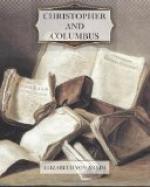“Going where?” asked Miss Heap, stopping by the table; whereupon Mr. Ridding had the slight relief of getting up.
Mrs. Ridding continued to eat impassively.
“Following these new signposts that are all over the place,” said Mr. Ridding. “Sort of paper-chase business.”
“Yes. I’d like to. Were you thinking of going, Mrs. Ridding?”
“After our nap,” said Mrs. Ridding, steadily eating. “I’ll take you. Car at four o’clock, Albert.”
She didn’t raise her eyes from her plate, and as Miss Heap well knew that Mrs. Ridding was not open to conversation during meals and as she had nothing to say to Mr. Ridding, she expressed her thanks and pleasure, and temporarily left them.
This was a day of shocks and thrills. When the big limousine—symbol of Mrs. Ridding’s power, for Mr. Ridding couldn’t for the life of him see why he should have to provide a strange old lady with cars, and yet did so on an increasing scale of splendour—arrived at the turn on the main road to San Blas which leads into Pepper Lane and was confronted by the final signpost pointing up it, for the first time The Open Arms and the Twist and Twinkler party entered Miss Heap’s mind in company. So too did they enter Mr. Ridding’s mind; and they only remained outside Mrs. Ridding’s because of her profound uninterest. Her thoughts were merged in aspic. That was the worst of aspic when it was as good as it was at the Cosmopolitan; one wasn’t able to leave off eating it quite in time, and then, unfortunately, had to go on thinking of it afterwards.
The Twist house, remembered her companions simultaneously, was in Pepper Lane. Odd that this other thing, whatever it was, should happen to be there too. Miss Heap said nothing, but sat very straight and alert, her eyes everywhere. Mr. Ridding of course said nothing either. Not for worlds would he have mentioned the word Twist, which so instantly and inevitably suggested that other and highly controversial word Twinkler. But he too sat all eyes; for anyhow he might in passing get a glimpse of the place containing those cunning little bits of youngness, the Twinkler sisters, and even with any luck a glimpse of their very selves.
Up the lane went the limousine, slowly because of the cars in front of it. It was one of a string of cars, for the day was lovely, there was no polo, and nobody happened to be giving a party. All the way out from Acapulco they had only had to follow other cars. Cars were going, and cars were coming back. The cars going were full of solemn people, pathetically anxious to be interested. The cars coming back were full of animated people who evidently had achieved interest.




